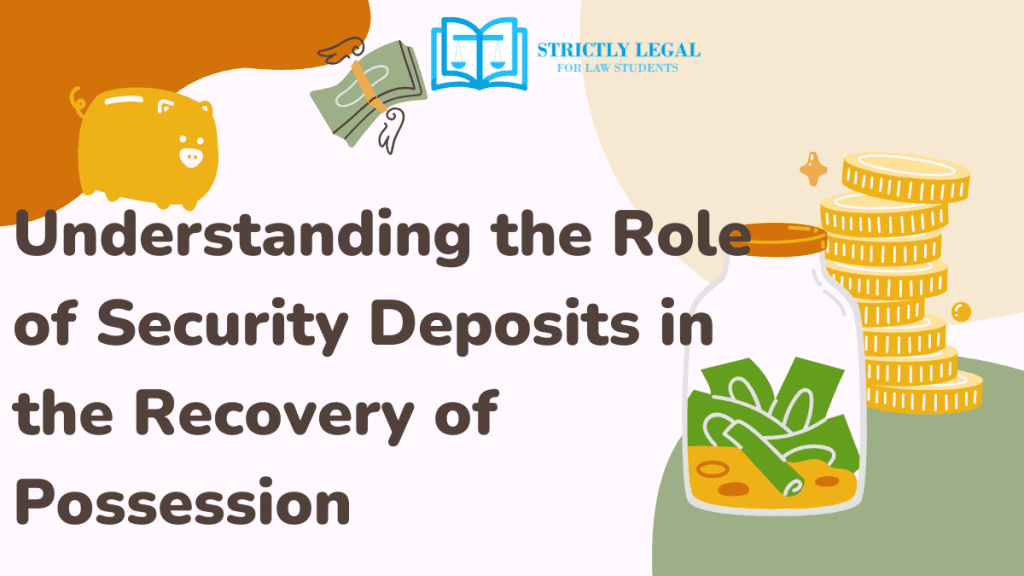Landlord-tenant disputes are a common aspect of property management, and one of the most contentious issues often revolves around the recovery of possession. Whether it’s due to non-payment of rent, lease violations, or the expiration of a rental agreement, landlords may need to take action to recover possession of their property. However, the process can become even more complicated when security deposits come into play. A security deposit is meant to protect the landlord from financial loss in case of property damage, unpaid rent, or other breaches of the lease agreement. It’s a financial safeguard for the landlord, but it can also become a source of dispute between the landlord and the tenant, particularly when possession needs to be regained. In this article, we’ll explore the role of security deposits in the recovery of possession, common legal issues related to them, and best practices for landlords to ensure they stay within the bounds of the law.
Table of Contents
What is a Security Deposit?
A security deposit is a sum of money paid by the tenant to the landlord at the beginning of a lease. It serves as a form of protection for the landlord against potential damages, missed rent payments, or violations of the lease terms. Typically, the amount of the deposit is equivalent to one or two months’ rent, though this can vary depending on local laws and the specifics of the lease agreement.
The deposit is refundable at the end of the lease term, provided the tenant has not caused significant damage to the property, owes any unpaid rent, or violated the lease in other ways. If the landlord needs to retain part or all of the deposit, they must provide an itemized list of damages or other reasons for withholding it.
The Role of Security Deposits in the Recovery of Possession
When a landlord seeks to regain possession of a rental property, the status of the security deposit can play a crucial role in the legal process. The following are key points to understand about security deposits in the context of possession recovery:
Use of Security Deposits to Cover Damages
If a tenant causes damage to the property during their tenancy, the landlord may use the security deposit to cover repair costs. In such cases, the landlord might not immediately seek to recover possession but could use the funds to repair damages before renting the property to a new tenant. However, if the tenant leaves the property before the end of the lease or violates the terms of the agreement, the landlord may also use the security deposit to cover any costs associated with regaining possession—such as cleaning fees, missed rent payments, or legal expenses related to the eviction process.
Eviction and Security Deposits
In cases of eviction, the security deposit might be in dispute. If a landlord decides to evict a tenant for failing to pay rent or violating the lease, the question of whether the tenant is entitled to the return of the security deposit becomes a point of contention. In many jurisdictions, landlords are required to return the security deposit, minus deductions for damages or unpaid rent, within a certain timeframe after the tenant vacates the property. If the eviction process is prolonged, the tenant may continue to argue for the return of their deposit, creating legal complexities for the landlord when trying to recover possession.
Failure to Return Security Deposits Promptly
Landlords who fail to return the security deposit within the time required by state or local law may face legal consequences. In some states, tenants can sue for the return of the deposit, and the landlord could be required to pay penalties in addition to the deposit itself. This failure to return the deposit promptly can also delay the process of regaining possession. Tenants may withhold cooperation or contest the eviction if they feel their security deposit has been unfairly withheld or misused, which can lead to prolonged legal disputes and delays in the recovery of possession.
The Role of Security Deposits in Tenant Negotiations
In some cases, tenants may negotiate their departure based on the return or non-return of their security deposit. For example, if a tenant is being evicted for non-payment of rent, they may agree to vacate the premises if the landlord agrees to return a portion of their deposit. However, this situation can complicate the legal process of recovering possession. Landlords should be cautious about making any promises regarding the security deposit without fully understanding the financial situation or having a clear record of damages or unpaid rent.
Common Legal Issues Related to Security Deposits in the Recovery of Possession
The relationship between security deposits and possession recovery is regulated by law in most jurisdictions. Landlords and tenants must adhere to specific rules to avoid legal disputes.
Unlawful Withholding of Security Deposits
Landlords who withhold a tenant’s security deposit without a legitimate reason may be subject to legal action. In order to avoid disputes, landlords must provide an itemized list of damages or unpaid rent when withholding any portion of the deposit. Failure to do so could result in a lawsuit by the tenant, further complicating the process of regaining possession.
Security Deposit Limits and Local Laws
Many states and local jurisdictions have laws that limit the amount a landlord can charge for a security deposit. If a landlord charges a deposit that exceeds the legal limit, the tenant could file a complaint, and the landlord may be required to return the excess amount and face additional penalties. Landlords should familiarize themselves with local laws regarding security deposit limits and ensure they are in compliance to avoid unnecessary legal complications.
Disputes Over Property Condition
A tenant may contest deductions from their security deposit if they believe the property was left in good condition. For example, if a tenant vacates a property and disputes claims of damage, the landlord may find themselves involved in a legal battle over the condition of the property. This can delay possession recovery and lead to unnecessary litigation.
Security Deposits and Rent Arrears
If a tenant owes back rent, the landlord may attempt to apply the security deposit to cover those arrears. However, landlords should be careful not to violate the terms of the lease or local rent laws by using the deposit in this way. A failure to apply the deposit in accordance with the law may result in legal repercussions, including an inability to recover possession.
Suggestions/Steps to be taken by Landlords
To avoid disputes and ensure the smooth recovery of possession, landlords should adopt the following best practices:
Maintain Documentation: Always document the condition of the property before and after the tenant’s occupancy, and keep records of rent payments, repairs, and other communications. This documentation can help defend against disputes over security deposit deductions.
Provide Itemized Statements: If deducting any amount from the security deposit, landlords should provide a detailed itemized list of damages or outstanding rent to the tenant. This transparency can help prevent legal disputes.
Follow Local Laws: Ensure compliance with local security deposit laws regarding the amount charged, the timeframe for returning the deposit, and allowable deductions. Staying informed about local regulations will reduce the risk of legal issues.
Consider Mediation: If a dispute arises regarding the return of the security deposit or possession, consider using mediation as a less confrontational and more cost-effective alternative to litigation.
Conclusion
In landlord-tenant disputes, security deposits play a pivotal role in the recovery of possession. While they protect landlords from financial loss, they can also be a source of conflict if not managed properly. By adhering to legal requirements, maintaining transparency, and following best practices, landlords can avoid unnecessary disputes and ensure a smoother process for recovering possession of their property. Both landlords and tenants must understand their rights and responsibilities regarding security deposits to ensure fair and lawful handling of the recovery of possession.

Law student.
Turning legal insights into engaging narratives.





